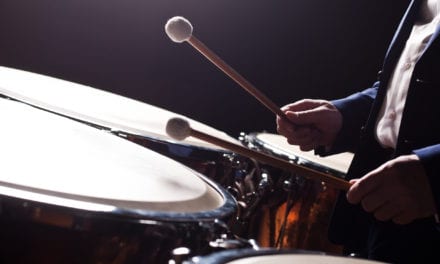By: Kristin Conrad
It was during her time playing saxophone in high school that Shemeka Nash realized the unique power of music and how many of her friends loved attending band class.
“I remember a few of the kids in my section would cut some of their other classes for the day, but they came back to school just to play,” Nash said. “I thought, ‘Okay, if this is what is keeping some students in school so they can graduate, then I think this is what I want to do.’ Also, for some kids, just being part of something positive and everybody trying to reach the same goal is something that kept them coming to school. Once I realized the power of music – that’s why I decided to be a band director.”
Nash went on to study music in college, where she received a Bachelor of Music Education degree from DePaul University and Master of Music Education degree from Northwestern University. She holds National Board Teacher Certification for the area of Early Adolescence Through Young Adulthood (EAYA) Music.
Nash is currently the Fine Arts Department Chair at Morgan Park High School. She is also Director of Bands, conducting the Concert, Jazz, Marching, and Modern Band for Grades 7 through 12. In addition, Nash is the Artistic Manager of Sistema Ravinia West Side, where she conducts orchestra two days per week after school. Born and raised in Chicago, Nash is certainly giving back to her city.


“Ravinia allows me to teach students on the West Side of Chicago, where I’m from, and Morgan Park is on the South Side,” Nash said. “So, I’m able to teach and reach students in two large sections of the city, which I really enjoy.”
Today, Nash is able to provide her students with unique opportunities and experiences.
“Music has helped to open my mind to different possibilities and different cultures, people from different ethnicities, and just learning to appreciate culture other than my own. And that’s one of the things that I try to also provide for my students,” Nash said. “I use music to help students have different opportunities that they wouldn’t normally have. It’s important for students to see different parts of Chicago and understand different cultures.”
Nash is passionate about teaching in the Chicago Public School system, and she wants people to know more about city schools, in general, and the important work being done each day.
“We do the best that we can because it is a tough situation, but we really, really try. And every music director that I know in Chicago – everybody’s working super hard and we’re doing it because we want the kids to have the best experience possible. We want them to have the best opportunities.”
One specific challenge Nash faces is the affordability of instruments, music, and classroom supplies. She discussed how this issue affects school districts across the country in both urban and rural areas.
“I had a mentor who told me that I have to look past the instruments that we have and still teach the kids anyway – and that’s what I did. We don’t have brand new instruments here at the school, and I don’t let the instruments hold me back from what I’m able to teach or achieve with the students,” Nash said. “But, I just really think if things were more affordable – if anybody could ever find a way to help the music industry figure out how to supplement things so it’s just not so expensive, I think our country would be changed drastically, because music is so powerful. And if more students had access, it would make things much better for everybody.”
Nash is an active saxophonist in Chicago, a member of many professional organizations, and co-chair of the Diversity, Equity, and Inclusion Committee for Women Band Directors International (WBDI). This committee works to help WBDI support all women of color, and both current members and future women band directors who still do not see their identity reflected in who they see on the podium.
When asked what advice she might give the next generation of music educators, Nash emphasized the importance of staying true to who you are.
“Just be yourself and find your own course throughout your career,” Nash said. “Students can see through fakeness a mile away, and they will love you more if you’re real. There are certain things that you don’t know about – let them teach you. And then if there’s certain things that they don’t know about, you teach them. And that’s how you make the connection with the students. That’s how you build good ensembles, because now you have a bond. Because you’re sharing who you are.”



